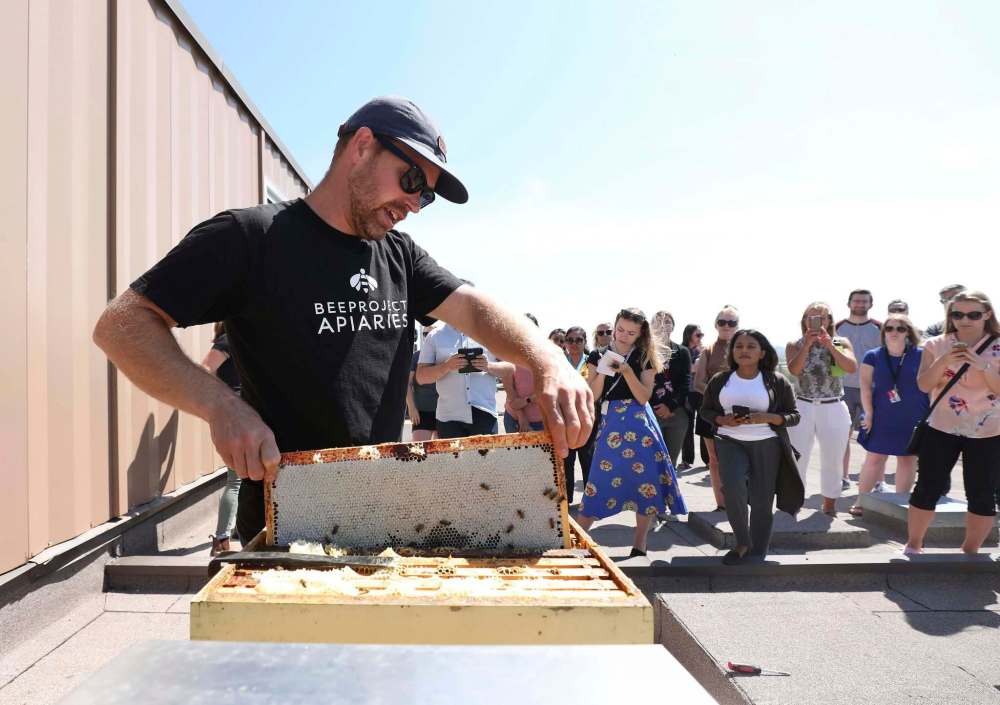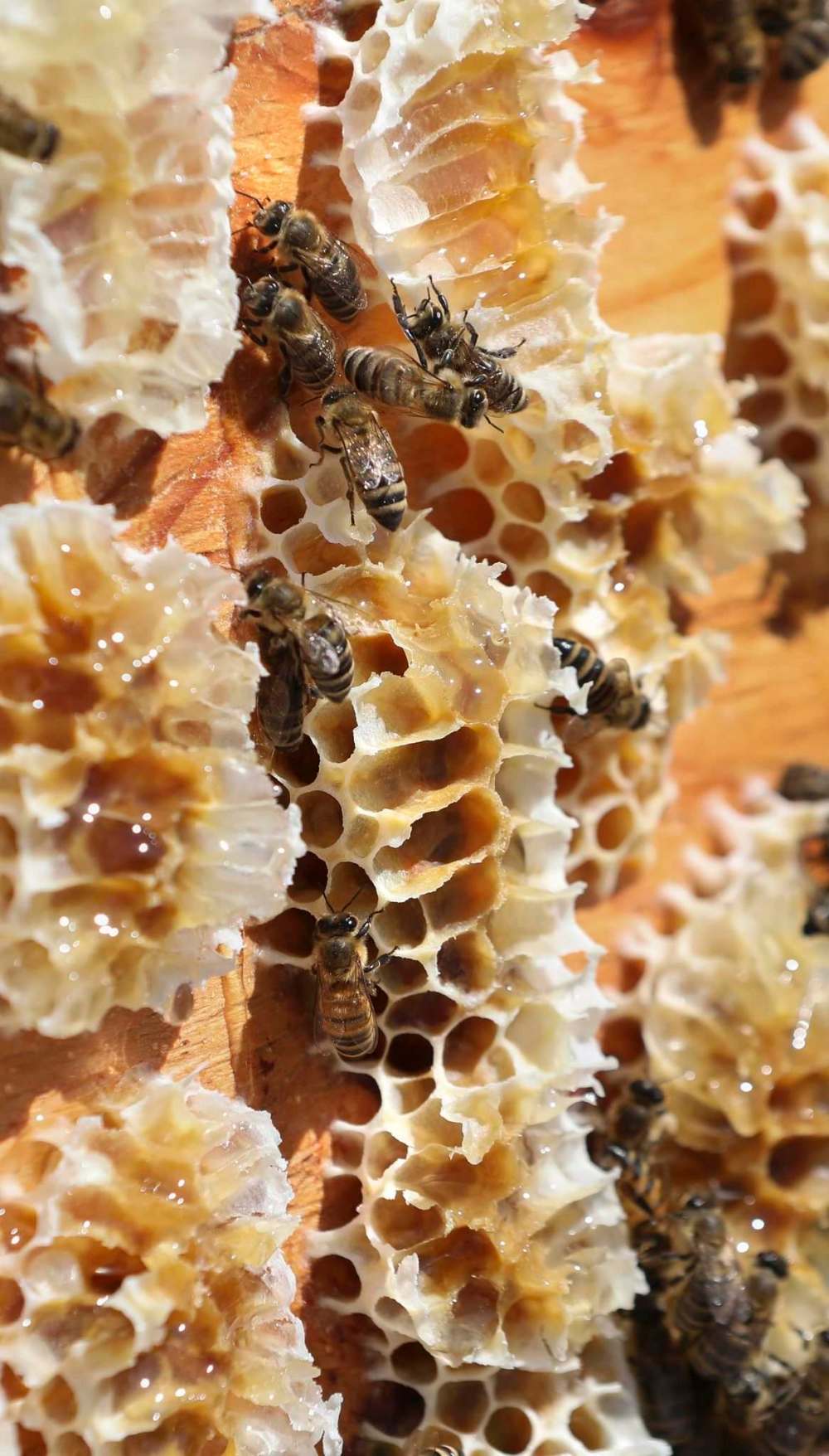College roof a beehive of activity
Workshop teaches urban honey extraction
Advertisement
Read this article for free:
or
Already have an account? Log in here »
To continue reading, please subscribe:
Monthly Digital Subscription
$0 for the first 4 weeks*
- Enjoy unlimited reading on winnipegfreepress.com
- Read the E-Edition, our digital replica newspaper
- Access News Break, our award-winning app
- Play interactive puzzles
*No charge for 4 weeks then price increases to the regular rate of $19.00 plus GST every four weeks. Offer available to new and qualified returning subscribers only. Cancel any time.
Monthly Digital Subscription
$4.75/week*
- Enjoy unlimited reading on winnipegfreepress.com
- Read the E-Edition, our digital replica newspaper
- Access News Break, our award-winning app
- Play interactive puzzles
*Billed as $19 plus GST every four weeks. Cancel any time.
To continue reading, please subscribe:
Add Free Press access to your Brandon Sun subscription for only an additional
$1 for the first 4 weeks*
*Your next subscription payment will increase by $1.00 and you will be charged $16.99 plus GST for four weeks. After four weeks, your payment will increase to $23.99 plus GST every four weeks.
Read unlimited articles for free today:
or
Already have an account? Log in here »
Hey there, time traveller!
This article was published 25/07/2019 (2351 days ago), so information in it may no longer be current.
Students and staff at Red River College’s Notre Dame campus overcame their fear of bee stings to embrace a sweet surprise.
Accompanied by Chris Kirouac and Lindsay Nikkel of Beeproject Apiaries, approximately 25 people gathered on a rooftop to inspect three urban beehives that were buzzing with activity.
Until 2018, the local hobby-beekeeping duo operated Beespace in Osborne Village to teach the public about honey extraction. Despite its closure, Beeproject Apiaries hosts workshops and public-education initiatives about bees in urban spaces.

Four years ago, the college partnered with Beeproject Apiaries to host a hive on its roof in order to engage staff and students in sustainability efforts.
“Over the years, we have taken it one year at a time and followed the little things that we were passionate about, so we have been trying to do collaborations,” said Kirouac, who has been urban beekeeping for about eight years.
After Kirouac smoked the beehive, he gently removed wax-covered frames — home to docile drone bees — that dripped with honey.
“On a community level, we need people to see that bees are not to be feared, and so they can join us on a rooftop and really get involved and see that they can do something,” Nikkel said.
During the demonstration, Kirouac explained the importance of pollinators in the food system, current threats to honeybees and how the public can help the bee population.
“It’s a team effort,” Kirouac said.
“Not one guy putting a beehive on his roof is going to solve everything. It’s getting people motivated, celebrating how the planet gives us our food, and the bees are a big part of that.”
Kirouac encouraged the group to think critically about what could be planted in gardens and about environmental-protection rules on local and provincial levels.
The demonstration was done in partnership with the college, which has been named one of Canada’s greenest employers for the ninth consecutive year.
Sara MacArthur, director of sustainability at the college, said staff members have demonstrated a commitment to the bees by planting a pollinator-friendly garden.

“(The pollinator garden) is really encouraging that biodiversity of plant species to give not only our honeybees, but also native pollinators, a whole bunch of nice plants to forage on,” MacArthur said.
The garden includes harebell flowers, black-eyed Susans, giant hyssops and yarrow. The variety of flowers gives bees a more diverse diet, which helps create stronger colonies.
Beeproject Apiaries will continue to visit the hives every two weeks to check on the queen bee’s health and colony size, and to extract honey.
Although hives in the countryside tend to produce more honey than those in the city, Kirouac says the college’s hives are expected to yield about 100 pounds of the golden liquid.
This fall, the Notre Dame campus will sell the honey at the college store and its farmers markets.
nadya.pankiw@freepress.mb.ca

Nadya Pankiw
Multimedia producer
Nadya Pankiw is a multimedia producer at the Free Press. Nadya holds a Bachelor of Journalism from Carleton University and a Master of Publishing from Simon Fraser University. She joined the paper in 2020. Read more about Nadya.
Nadya is part of a team that curates and publishes journalism on our websites, apps and social media. It’s part of the Free Press‘s tradition, since 1872, of producing reliable independent journalism. Read more about Free Press’s history and mandate, and learn how our newsroom operates.
Our newsroom depends on a growing audience of readers to power our journalism. If you are not a paid reader, please consider becoming a subscriber.
Our newsroom depends on its audience of readers to power our journalism. Thank you for your support.


